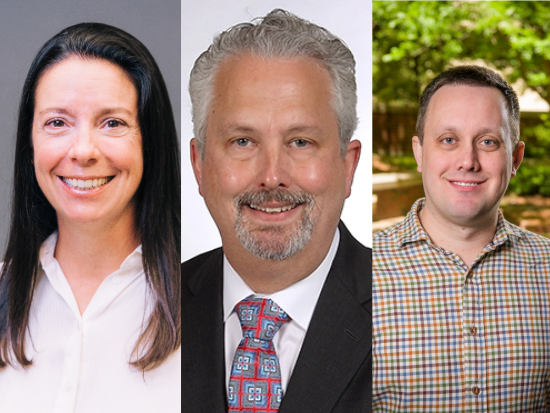 The shift from research to teaching can be transformative and inspiring in academia. Heather Bruns, Ph.D., professor and Vice Chair for Education in the UAB Department of Microbiology, Louis Justement, Ph.D., professor in the UAB Department of Microbiology, and Jared Taylor, Ph.D., assistant professor in the UAB Department of Microbiology, vividly illustrate this shift.
The shift from research to teaching can be transformative and inspiring in academia. Heather Bruns, Ph.D., professor and Vice Chair for Education in the UAB Department of Microbiology, Louis Justement, Ph.D., professor in the UAB Department of Microbiology, and Jared Taylor, Ph.D., assistant professor in the UAB Department of Microbiology, vividly illustrate this shift.
“At UAB, the Department of Microbiology values education on par with research and service,” said J. Victor Garcia-Martinez, Ph.D., professor and Charles H. McCauley Endowed Chair in Microbiology.
"For us, teaching is a science on its own, and we must master it to provide the quality of education our students deserve. Education is a commitment that we honor and value deeply. Our mission is to prepare the next generation of scientists and clinical professionals. We need to prepare them to be ready to face any new challenge that might present itself the way we did for AIDS, SARS, and COVID.”
Initially immersed in research, their journeys have evolved into a strong devotion to teaching, allowing them to make a meaningful difference in their students’ lives. Their experiences highlight how blending scholarly work with a passion for teaching has enriched their educator roles and impacted their fields.
Bruns, Justement, and Taylor discuss their motivations, passions, and the impact they aim to make on their students.
What motivated you to pursue a teaching-focused career path? How do you remain motivated and passionate?
Justement: I initially did not pursue an educational focus for my career. Instead, I managed a successful, funded research laboratory for over 30 years. However, my academic duties involved significant engagement with education, particularly at the professional (medicine, dental, and optometry) and graduate school levels. I have also actively promoted career and professional development for biomedical trainees institutionally and nationally. Additionally, when you have outstanding colleagues dedicated to the educational mission and who work closely together as a team, you have many opportunities to create a synergistic environment that facilitates each individual’s success through innovative educational approaches and research projects. Most importantly, being part of a collegial community of educators who support one another is incredibly enjoyable.
Bruns: I have always been passionate about education. During my doctoral training in immunology, I actively sought opportunities to study pedagogy and faculty development. My first academic position allowed me to both teach and conduct research. While I enjoyed immunology research and lab training, I discovered that my true passion lay in teaching in the classroom and developing innovative educational strategies. At UAB, the only institution offering an undergraduate immunology major, I was thrilled to focus solely on immunology education and research. I remain deeply motivated because effective practices in immunology education, especially at the undergraduate level, are still emerging, and I am excited to contribute to this evolving field.
Taylor: When I started college at Millersville University of Pennsylvania, I had not yet declared a major and was uncertain about which field to pursue. I ultimately chose biology, inspired by the passionate teaching of Dr. James Moné in Biology 100. His course ignited my interest, leading me to pursue a degree in biology. Throughout my time at Millersville University, I learned from exceptional, teaching-focused faculty members whose passion for biology was infectious. This experience inspired me to follow in their footsteps, hoping to have a similar impact on my students one day. Now, as a teaching-focused faculty member at UAB, what keeps me motivated and passionate is the knowledge that I can significantly impact my students. I continuously strive to improve my teaching, understanding that a positive experience in my class can decide whether a student remains in science or chooses to leave the field.
Could you share a memorable teaching success story or experience that has impacted your career?
Justement: Two of my most meaningful accomplishments are: 1) overseeing the creation and state approval of the nation's first undergraduate immunology major, the Undergraduate Immunology Program, which remains unique in the country and is co-directed with Bruns in the Department of Microbiology; and 2) helping to establish ImmunoReach, a National Research Coordination Network funded by the National Science Foundation, which unites immunology educators nationwide to develop, test, and share interdisciplinary learning activities and resources.
Taylor: As a teaching faculty member, nothing is more memorable or rewarding than witnessing my students' successes. I teach seniors in UAB’s Undergraduate Immunology Program and have seen many successfully apply to and be accepted into medical schools, Ph.D. programs, and other professional or graduate programs. Being part of their academic journey and contributing to their success is incredibly fulfilling.
What impact do you hope to have on your students?
Justement: My goal is to equip students and trainees with the skills and knowledge necessary for success across diverse career paths. This includes fostering excellence in transferable skills such as communication, problem-solving, critical thinking, leadership, and ethics, which are essential for thriving in any profession.
Bruns: I teach students across various academic levels and career paths, aiming to instill a passion for the immune system similar to my own. My ultimate goal is for students to leave my class with a deeper understanding of immunology and a sense that I genuinely care about their personal growth. I consider my objectives fulfilled if they gain more knowledge and feel valued as individuals.